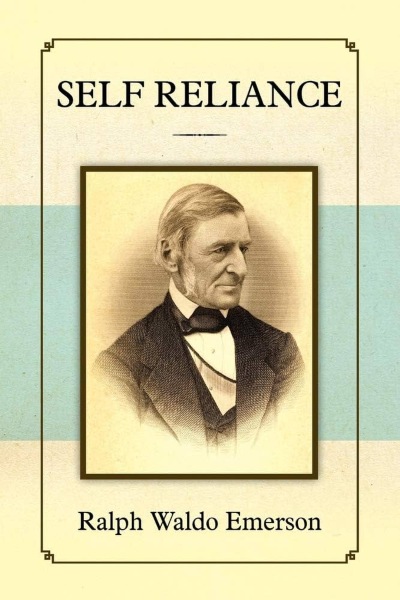Self Reliance, Ralph Waldo Emerson
This review captures Emerson’s core ideas and explores how Self-Reliance remains relevant in today’s world. Emerson’s call for authenticity and inner strength is timeless, offering guidance for navigating modern challenges. His message about trusting oneself and resisting conformity resonates as powerfully now as it did when first published.
Ralph Waldo Emerson’s essay Self-Reliance remains one of the most influential works in American literature. First published in 1841, the essay promotes individualism, nonconformity, and the belief that trusting oneself is essential to living an authentic life. Emerson urges readers to reject societal expectations, focus on personal growth, and embrace their unique talents. This self reliance book review will explore Emerson’s key ideas, the conflict between individuality and society, the essay’s spiritual dimension, and its enduring relevance today.

Emerson’s Core Ideas in Self-Reliance
In Self-Reliance, Emerson presents several philosophical concepts that form the foundation of his transcendentalist beliefs. He challenges readers to trust in their intuition, warning that conformity leads to mediocrity. Emerson views self-reliance as the ultimate expression of personal freedom, where individuals are not bound by society’s conventions or the expectations of others. His essay is a call to embrace independence and inner strength, even in the face of criticism.
Key points from the essay include:
- Individualism: Emerson believes that each person has a unique path and must pursue it to achieve fulfillment.
- Nonconformity: He argues that true greatness is found in resisting societal pressures and standing apart from the crowd.
- Trust in oneself: Emerson encourages people to listen to their inner voice and instincts rather than relying on the approval of others.
- Avoid imitation: According to Emerson, imitating others prevents individuals from reaching their full potential.
These ideas make Self-Reliance a powerful guide for personal development. By advocating for self-trust and personal responsibility, Emerson invites readers to break free from conformity and live their most authentic lives.
The Struggle Between Individuality and Society
One of the essay’s key themes in this self-help book is the tension between individuality and societal expectations. Emerson argues that society often imposes limitations on personal freedom by encouraging conformity. He believes people suppress their unique talents and desires to fit in, which prevents them from discovering their true potential. Emerson argues societal norms act like chains, binding people to mediocrity and trapping them in imitation instead of authenticity.
Emerson writes,
“Envy is ignorance, imitation is suicide”
This line captures his view that copying others’ success or conforming to societal expectations is a form of self-betrayal. Emerson urges readers to understand that true greatness lies in following their own path, no matter how unconventional it may be.
This struggle between the individual and society remains relevant today, particularly in a world dominated by social media, where external validation often defines success. Emerson’s argument is a powerful reminder to resist the urge to conform and to focus on cultivating inner strength. The essay’s timeless appeal lies in its ability to inspire readers to live authentically in the face of external pressures.

Self-Reliance and Spirituality
Emerson’s concept of self-reliance goes beyond personal independence. He views it as a spiritual principle, suggesting that true self-reliance means living in harmony with the universe and recognizing the divine within oneself. Emerson believes that when individuals trust themselves, they align with a higher moral law that transcends societal rules. This spiritual dimension elevates the essay from a simple self-help guide to a profound meditation on the nature of existence and individual purpose.
Emerson famously writes,
“Trust thyself: every heart vibrates to that iron string.”
This quote shows Emerson’s belief that each individual is connected to a greater truth through trusting their instincts. For Emerson, self-reliance means not just living independently but aligning with one’s highest self, connected to the divine.
The essay also emphasizes authenticity in relationships. Emerson argues that by being true to oneself, individuals can form deeper, more meaningful connections with others. He believes that only through honesty and authenticity can people build relationships based on mutual respect rather than shallow conformity. This spiritual aspect of self-reliance adds a layer of depth to Emerson’s philosophy, making it a compelling and holistic approach to life.
Modern Relevance and Key Takeaways
Although Self-Reliance was written in the 19th century, its message resonates just as powerfully today. In a world where conformity dominates, Emerson’s call for individual strength and self-trust guides those seeking personal and spiritual growth. The essay’s themes of authenticity, nonconformity, and responsibility are especially relevant today, where social media often overshadows self-worth with external validation.
Key takeaways from the essay include:
- Authenticity: Emerson encourages readers to live authentically, pursuing their unique path without regard for others’ opinions.
- The courage to be misunderstood: Emerson believes that true greatness often comes with being misunderstood. He urges readers to embrace this discomfort as part of the journey toward self-reliance.
- Living above time: Emerson advocates for living in the present moment, free from the constraints of past failures or future anxieties.
These principles can be applied in various aspects of modern life, from career decisions to personal relationships. By encouraging individuals to prioritize their inner voice, Emerson’s essay offers timeless advice for navigating a world that often values conformity over individuality.

Conclusion: A Timeless Call for Individual Strength
Ralph Waldo Emerson’s Self-Reliance continues to inspire readers with its bold message of personal independence, authenticity, and nonconformity. Emerson’s eloquent prose and thought-provoking ideas challenge readers to trust themselves and resist societal pressures.
This self reliance book review emphasizes the essay’s enduring relevance, particularly in a society that often prioritizes external validation over personal growth. By embracing Emerson’s philosophy, readers can break free from conformity and live a life guided by their inner truth.






